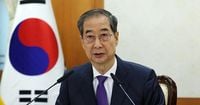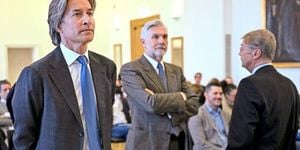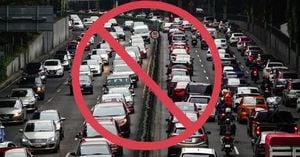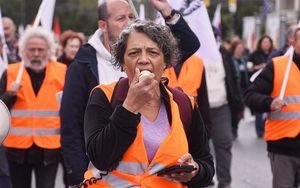On May 1, 2025, South Korea's Acting President and Prime Minister Han Duck-soo announced his resignation, a move that has sent ripples through the political landscape of the nation. In a press conference, Han stated, "After careful and thorough consideration of whether such a decision is indeed right and unavoidable, I have decided that if this is the only path, I must take it." His resignation comes amidst a backdrop of political turmoil, following the impeachment of former President Yoon Suk Yeol.
Han's decision to step down has ended weeks of speculation regarding his potential candidacy in the upcoming elections that were prompted by Yoon's impeachment. This political shake-up is significant, as it marks a crucial moment in South Korea's governance, especially following Yoon's recent indictment on charges of abuse of power.
Earlier on the same day, prosecutors announced that they had formally charged Yoon Suk Yeol, who is currently embroiled in legal battles stemming from allegations of misconduct during his presidency. Yoon faces accusations of abusing his authority and obstructing the lawful exercise of rights. This indictment is the latest in a series of legal troubles for Yoon, who was previously indicted in January 2025 for allegedly colluding with former Defense Minister Kim Yong Hyun and others to incite rebellion. This alleged conspiracy involved the declaration of an unconstitutional and illegal state of emergency on December 3, 2024, despite no signs of war, armed conflict, or national crisis.
The political climate in South Korea is increasingly fraught with tension as citizens watch the unfolding drama. Han Duck-soo's resignation is seen as an attempt to distance himself from the controversies surrounding Yoon, although it raises questions about the future direction of the government. With the country heading towards elections, the implications of this political shift could be profound.
In addition to the political upheaval, other significant events are occurring both domestically and internationally. A group of experts from California recently announced an "optimistic" breakthrough in the search for treatments to cure memory loss, highlighting ongoing advancements in medical science. This development is particularly relevant as society grapples with the challenges of aging populations and increasing rates of dementia.
Meanwhile, a study from the United States has revealed alarming findings regarding the safety of cosmetics. Researchers have identified a type of permanent chemical found in thousands of beauty products that may be responsible for over 350,000 deaths each year. This shocking statistic underscores the need for greater regulation and awareness surrounding cosmetic safety.
On a different note, the Dominican Republic has taken a hard stance on immigration, deporting over 130 Haitian women and children on the first day of a campaign aimed at addressing undocumented immigration. This action has raised concerns among human rights advocates, who argue that such measures can exacerbate the plight of vulnerable populations.
The convergence of these events paints a complex picture of a nation at a crossroads. As Han Duck-soo steps down, the ramifications of his resignation will likely be felt across various sectors, from politics to public health and immigration policy. As South Korea navigates these turbulent waters, the decisions made by its leaders will undoubtedly shape the future of the country.
In the wake of Han's resignation, political analysts are keenly observing the reactions from both the public and other political figures. Will this resignation pave the way for new leadership, or will it further complicate an already tense political environment? The upcoming elections will serve as a critical juncture for South Korea as it seeks to mend its fractured political landscape.
For now, the nation watches closely as the implications of these events unfold. The combination of political instability, medical advancements, and immigration challenges presents a unique set of circumstances that will test the resilience of South Korean society.
As citizens await the next steps in this unfolding drama, the hope remains that the future will bring clarity and stability. With Han Duck-soo's departure, the stage is set for a new chapter in South Korea's political narrative, one that will require careful navigation through the complexities of governance, public health, and social responsibility.
In conclusion, the resignation of Han Duck-soo marks a pivotal moment in South Korean politics, coinciding with significant developments in health and immigration policy. The coming weeks will be crucial as the nation prepares for elections and contemplates its path forward amidst ongoing challenges.




